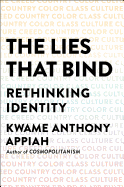
"I aim to persuade you that much of our contemporary thinking about identity is shaped by pictures that are in various ways unhelpful or just plain wrong," writes Kwame Anthony Appiah (As If: Idealization and Ideals), a professor of philosophy and law and a prolific author. In The Lies That Bind, he challenges and debunks popular ideas about identity. "We are living with the legacies of ways of thinking that took their modern shape in the nineteenth century, and... it is high time to subject them to the best thinking of the twenty-first."
We are led astray, says Appiah, by our willingness to attribute essential qualities to groups of people based on whatever unexamined generalizations we have heard. He limits himself to five categories of identity often discussed as if they can be pure, or have fixed definitions: creed, country, color, class and culture, with a substantial nod to gender as well. With erudition and clarity, he demolishes them all. He analyzes historical disagreements within religions, the relatively recent invention of race and of nation states, the destructive inherited hierarchies of class; he describes culture as innately fluid, a "process you join, in living a life with others." Identities are inescapable, he says, but "the problem is not walls as such but walls that hedge us in; walls we played no part in designing... walls that block our vision and obstruct our way." Rather than use identities to separate ourselves, we can use them to "give contours to our freedom... connect the small scale where we live our lives alongside our kith and kin with larger movements, causes, and concerns." --Sara Catterall

